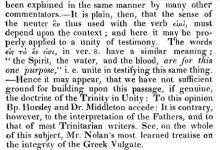Steven Avery
Administrator
MOST ON BVDB with Matt
https://www.tapatalk.com/groups/bib...enticity-of-1-john-5-7-t6020-s250.html#p80341
Various writers and doctrinal positions used wording that had its source in the heavenly witnesses verse.
You are dancing around on quotes from Eusebius, Hilary and the Symbolem Antiochenum and the Disputation of Athanasius with an Arian at Nicea that all point to the heavenly witnesses.
Then we can add the Vulgate Prologue and Homily 69 from Jerome and Priscillian's text.
Plus the references from Origen's Psalm scholium, Tertullian and Cyprian (a key loci since the arguments against the reference are a joke.)
All leading up the Council of Carthage, where the Bibles of a large Meditteranean region contain the verse, "Arians" ( homoian, some say is a better description) and the Orthodox, who put a special strong emphasis on the verse as Johannine scripture.
Others can be added.
The main interest in this thread is that the unity of agreement idea had some support in the early centuries,
a bit like John Calvin, or as Erasmus referenced would be the Arian counter, and others.
On Erasmus Trinity thread
https://www.facebook.com/groups/467...k/721704558675409/?comment_id=722112581967940
Erasmus and the Arians: Remarks on the "Consensus Ecclesiae"
James D. Tracy
https://www.jstor.org/stable/25020997
12 LB IX, 353BC: in regard to the disputed text in 1 John 5 concerning the three heavenly witnesses—which Erasmus in 1516 had said was added to the text to refute the Arians—he contends, against Stunica. that the Arians would ‘with equal right’ (pari jure) insist on the reading favorable to their position; even if the genuineness of this passage be granted they would not be ‘so stupid’ as not to realize that it could still be interpreted in a manner congruent with their beliefs, as Augustine himself does in writing against the Arian Maximian: “ ‘The Three are one. that is, they testify to the same thing.’ ” As elsewhere (see below, notes 17, 18), he concludes: “Certe ego, quod negant Arriani, non video posse doceri, nisi ratiocinatione.”
Note that this is supposed to be in the context of the mystical allegorical interpretation.
Erasmus and the Problem of the Johannine Comma
Joseph M. Levine
https://www.jstor.org/stable/3653961?read-now=1&seq=17#page_scan_tab_contents
It is true that Erasmus had pointed out more than once that the Fathers had stretched the meaning of a Biblical text to give it a trinitarian meaning. His friend, Wolfgang Capito, had seen the danger already in 1516 and urged him to soft-pedal.70 What Erasmus himself believed about the Trinity is still a little obscure. He was certainly soft on the Arians, whom he preferred to think of (with Jerome) as schismatic rather than heretical. He saw them in their historical setting, and made some effort to treat them dispassionately, even sympathetically.71 Yet he had no wish to see Arianism revived; as always, he abhorred division, and his own emphasis on the moral and practical purposes of Scripture and religion left him indifferent to metaphysical disputes. “Had I had any authority at those [ancient] synods where the peace of the world was at issue, I would have argued that it were better to profess ignorance of what the words homoousion or homoiousion portend with regard to the divine Persons, rather than either to maintain or attack them at the cost of such great tumult.”72
Last edited:

